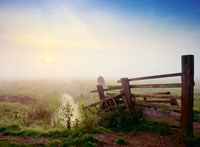Poor flood defences leave farmers at mercy of climate change

Deteriorating flood defences threaten to leave farmers in Britain’s biggest wetland area at the mercy of climate change, warns a report.
The Norfolk and Suffolk Broads cover more than 30,000ha (75,000 acres) of floodplain close to the East Anglian coast. Recognised as internationally important wetlands, they form Britain’s only water-based national park.
Climate change is the biggest threat facing the Broads, warns an NFU report, which forecasts a 30cm rise in sea levels over the next 50 years. The document, Why Farming Matters in the Broads, was launched on Thursday (24 June).
“The Broads faces major risks associated with the threat of climate change,” it says. “It seems increasingly likely that, in the long term, the Broads will be subject to increased frequency and severity of floods and droughts.”
The report calls for long-term investment in the maintenance of existing sea and river defences – particularly those that protect the best agricultural land and help farmers contribute more than £150m a year to the local economy.
NFU East Anglia senior policy adviser Paul Hammett said: “Farming is an integral part of the Broads, producing food and renewable energy, managing the landscape and providing local employment.”
With the right policies in place, farmers and growers could help meet future demand for food and fuel while maintaining and enhancing the Broads environment and helping the region adapt to climate change.
Climate projections suggest the next 50 years will see the Broads become warmer and wetter in winter and hotter and drier in summer. Sea levels are predicted to rise by 6mm a year during this period.
At the same time, extreme weather events are likely to increase in frequency and severity. The Broads are protected by 150 miles of flood banks. But many are made of silty clay and have deteriorated over time.
Broads Authority chief executive John Packman said a breach in the flood defences would mean a loss of productive farmland, the loss of a unique landscape and the loss of the biodiversity that goes with it.
“Agriculture is a strategically important industry. It makes a major contribution to the landscape, tourism and community of the Broads, as well as helping adapt to climate change.
“The drainage management role that farmers perform will be a crucial part of our response to this challenge. Farmers are also key to maintaining and improving the Broads’ grazing marshes, an outstanding wildlife resource.”
